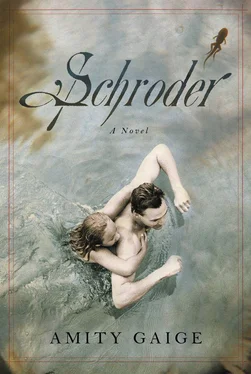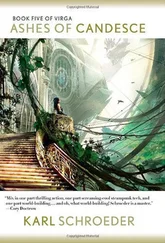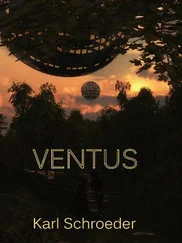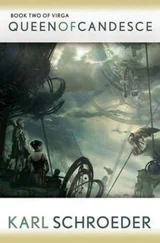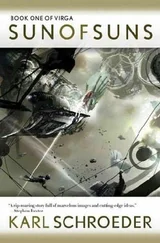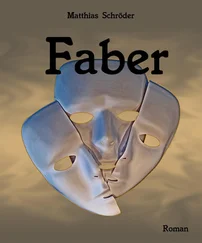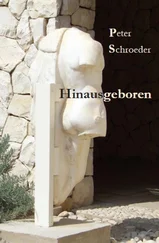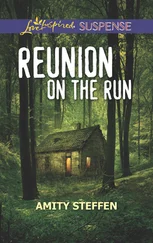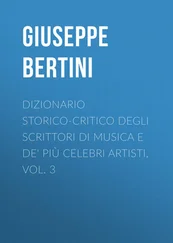Back at the ranch, I hid half of the cash behind a le Carré novel, and we sat on the ash-colored sand and ate cheese sandwiches and chocolate eggs and I smoked my cigar. Ours was a small, unnavigable cove, and the motorboats we saw in the lake beyond did not enter. Once, a pair of lady kayakers surprised us through the reeds, but there was something about Meadow standing guard in her spangled bikini, her legs caked with sand, that made them paddle away.
That afternoon, I was every kind of monster. I was a manticore. I was a merman. I was a hippogriff. A leviathan. When we ran out of amphibians, we went on to giants. I was Anteus. Paul Bunyan. Magog. Meadow’s job was to slay me. She ran me through with sticks, peppered me with pebbles, she pinecone-bombed me. As a rule, I am very good at dying. I stagger. I fall backwards. I cry chillingly. I float underwater for longer than you thought possible. (You should see me stiffening from tetanus!) Whenever I stayed underwater too long, I could hear Meadow’s garbled pleas above me, telling me to cut it out already, and I was strangely satisfied by the limits of the game. I enjoyed playing a game in which my death seemed ludicrous. We dried ourselves off with the scratchy guest towels and watched the stars enter the mind of the sky like a billion epiphanies. And I wondered momentarily if you weren’t right, Laura, about a God, because there was someone, someone superhuman, who had kept me from succumbing to the terrible ideations I’d had in the darkest of February.

It was late afternoon on our second day in Grand Isle when I became restless. Nothing was wrong; I’d just probably gone too long without adult conversation. I suggested to Meadow we go out for chow. She was game. We clambered into the Mini Cooper and began to make our way down Route 2, snaking back and forth across Lake Champlain, which seemed on the verge of spilling goldenly onto the roads. We drove through first-growth woods whose moss-colored shade itself seemed ancient. It was another glorious day, the third in a row. The light seemed purified. Winter had retreated in a torrent of dirty runoff, leaving the springtime world new and washed, like this.
“For all this country’s transgressions,” I mused aloud, “for all its abuses, its opportunism, its meanness, it sure is pretty. Don’t you think, Butterscotch?”
“It is pretty.”
“It really is a beautiful country. A lot of people come here, looking for somewhere to be safe and free.”
“They come to Ellis Island,” Meadow said.
“They used to, sure.”
“But if they come from Mexico, guards shoot at them.”
I nodded encouragingly. “I don’t think they get shot at per se. But yes, it is dangerous to come here sometimes. America can’t fit everybody, right?”
“I don’t see why not.” Meadow gestured out the window. “Plenty of space up here. They could live right there in those woods.”
I grinned. We both returned to staring at Vermont.
“You’re a sweet kid,” I said.
“I know that,” she said. “You tell me that all the time.”
The countryside receded and exchanged itself for a thicket of small houses, the outskirts of a town we soon discovered was North Hero. The town was, in essence, a barracks-style row of short retail spaces fronted with fluttering awnings. The parochial avenue was the same as in any small American town: a hardware store, a pet-grooming outfit, a coffee shop, an impossibly small public library. Meadow pointed out several eateries, but I kept driving. Just as we were on the verge of reentering endless Vermont countryside, I spied the neon glow I’d been looking for. The wheels whined as I pulled up to the curb.
“Wait here,” I said, walking up to the window to give the place a once-over. Through the wrinkled plastic tinting I saw a large man behind the bar pouring a coffee-brown pint of stout.
“Perfect,” I said to Meadow, throwing open her door and unsnapping her seat belt. “A cozy little pub. The perfect place for some local color.”
Meadow stepped from the car. Her purple velour sweatpants — the only other change of clothing she had in her overnight bag — were flecked with sand, and the sides of her unwashed hair had slipped out from her headband. I straightened her glasses and swatted clean her pants.
“There,” I said. “You’re such a pretty girl. Do you know that?”
“Technically, I’m not so pretty. I’m pretty ish . Rapunzel is pretty.”
“Rapunzel? Are you serious? What about Maria Callas or Benazir Bhutto or somebody like that?”
“No. Rapunzel is prettiest. I’ll show you her in my fairy-tales book when we get back home home.”
No heads turned when we entered. There was only one grizzled man sitting below the television, staring at the bottles behind the bar, and a booth along the wall in which a single woman applied lipstick from behind a compact mirror. I was overjoyed to see a plastic red basket on the table in front of her. The joint served food.
“Up here, honey.” I patted the stool beside mine at the bar.
When the bartender approached, I stuck my hand out. “How’s it going?”
“Good.” The bartender shook my hand once, hard. “How are you?”
“Very good,” I said. “Excellent.”
“You’d have to be an asshole to be unhappy on a day like this,” said the bartender, flipping a coaster onto the bar. “What can I get you?”
“Canadian Club on the rocks. And my daughter here will have two hot dogs and a Shirley Temple. Isn’t that right, sweetheart? Did I get that right?”
The bartender looked at Meadow. “How many cherries does the little lady want in her Shirley Temple?” he said, pouring me a generous drink. The ice cubes cracked like dry wood in a stove.
Meadow blushed and leaned her face against my arm.
“Come on now,” I said, “tell the nice man how many cherries you want. She can be sort of shy at first.”
“As many as you want,” said the bartender.
Meadow held up six fingers.
“Six!” the bartender bellowed. “That’s all?”
Meadow nodded.
“One for every year,” I said.
“You’re six ?” The bartender leaned against the bar across from Meadow, his big maw exaggerated in the track lighting. “Well, then you probably already know how the world works, right? You know about gravity? You know about taxes?”
Again Meadow buried her face in my arm. The bartender chuckled and grabbed a pint glass. I gave her shoulder a squeeze, drinking deeply with my free arm. Canadian Club is sweet up front, but somehow I’ve gotten used to this and can’t stand anything drier.
“Isn’t this fun?” I said to Meadow. “Isn’t this place a riot?”
I turned and surveyed the pub. The lady in the booth had snapped shut her compact mirror and gave me what looked like a wink. I smiled back, but she got up to leave. I tried not to stare at her big blond dandelion hair as it sailed across the mirror behind the bar.
“You count those cherries, sweetheart,” the bartender was telling Meadow, sliding her Shirley Temple toward her. “You shouldn’t trust anyone over the age of twelve. After twelve, it’s lies, lies, lies. You know about Area 51? You know about Roswell?”
The bartender was leaning across the bar again, smiling gamely. He had a wide, ironic face. He looked like he was waiting for something unpredictable to happen.
There are moments — I hate to say it — when a parent’s loyalties jump ship, and he just wants to be liked by another grown-up. Even the best parents with excellent parenting styles can’t help, on rare occasion, but side with their own kind, those on the downslope of life, and in this process they get the urge to gang up on somebody young, since it’s impossible to banish this instinct altogether, this throwing around of one’s hard-won experience.
Читать дальше
